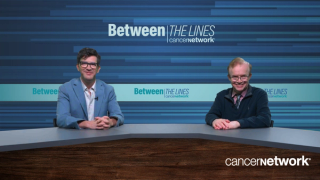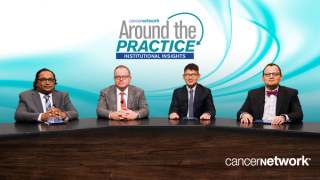
Multiple Myeloma
Latest News
Latest Videos

CME Content
More News
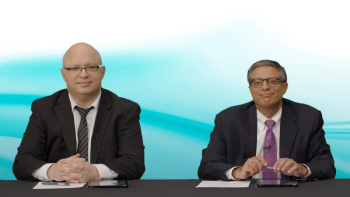
A complex case study in multiple myeloma management, exploring treatment sequencing options for a patient with a long history of disease and multiple lines of therapy.
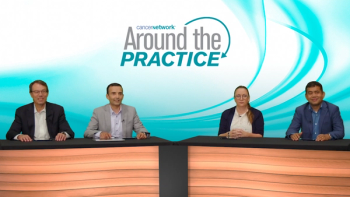
Multiple myeloma–treating oncologists provide comprehensive insights on deciding between bispecific antibody monotherapy, combination therapy, and CAR T-cell therapy.

Experts in the field of multiple myeloma gathered to discuss treatment options, including bispecific antibodies, CAR T-cell therapy, and current and future FDA approvals for treatments.

Experts in the field of multiple myeloma gathered to discusses treatment options including bispecific antibodies CAR T-cell therapy, and the importance of collaborative decision-making across clinics.

A panel of experts discusses the management of adverse effects including dysgeusia and infections among patients who received bispecific therapies for relapsed/refractory multiple myeloma in the context of a clinical case.
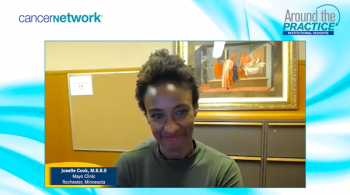
Joselle Cook, M.B.B.S., explains that she believes that elderly patients with relapsed/refractory multiple myeloma can still use bispecific therapies, though more objective data on frailty is needed.
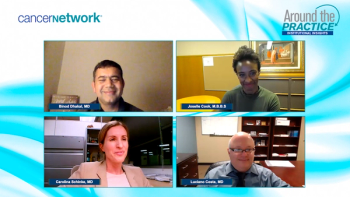
Drs Costa, Dhakal, and Cook discuss managing the unique toxicities of bispecific antibodies in patients with relapsed/refractory multiple myeloma such as infections requiring prophylaxis and supportive care, and quality-of-life complaints like taste changes and skin issues.

In a recent Training Academy, experts discussed how to incorporate bispecific antibodies into patients with multiple myeloma.
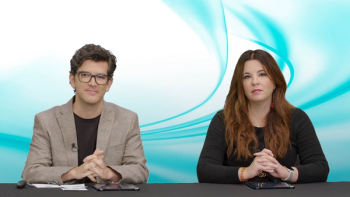
Gain insight into strategies for monitoring for ICANS and CRS in myeloma treatment, including inpatient and outpatient administration, tocilizumab, dexamethasone, and impact on patient care.

The panel continues their discussion on adverse effect management with a focus on GPRC5D-targeting bispecific antibodies in multiple myeloma.

Multiple myeloma specialists discuss the management of toxicities from BCMA-targeting bispecific antibodies.
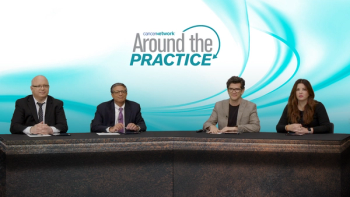
Key opinion leaders share their insight on managing adverse events in myeloma treatment, including dose adjustments and prophylactic strategies to improve outcomes and patient quality of life.

The panel discusses the efficacy of belantamab mafoditin and where the treatment fits in the multiple myeloma treatment landscape.

Experts in the multiple myeloma space met to discuss the treatment and monitoring after bispecific antibodies.

Joselle Cook, M.B.B.S., and Luciano Costa, MD, note promising trials investigating combination bispecific antibody therapies for patients with relapsed/refractory multiple myeloma.

Drs Luciano Costa and Binod Dhakal discuss combining bispecific antibodies with gamma secretase inhibitors for the treatment of relapsed/refractory multiple myeloma, but trials show limited benefit and added toxicity; more promising are combinations with immunomodulators like isatuximab.

Overview of challenges in managing adverse events associated with bispecific therapy in multiple myeloma, including dysgeusia, skin toxicity, and nail changes patients may experience.

Comprehensive insights on the management of adverse effects from bispecific antibodies in the treatment of multiple myeloma.

Experts share how the availability of three new bispecific therapies has transformed myeloma patient care, offering a lifeline to those previously without treatment options and showcasing positive responses in various patient populations.

Expert oncologists discuss dosing considerations for bispecific antibodies in the treatment of patients with multiple myeloma.

Karmanos Cancer Institute and Cleveland Clinic gave presentations regarding treatment of multiple myeloma and chronic myeloid leukemia in the latest Face Off.

Craig Cole, MD, reviews data from DREAMM-3 on the efficacy and safety of single-agent belantamab mafodotin in patients with relapsed/refractory multiple myeloma.
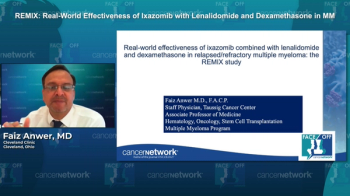
Experts on multiple myeloma discuss the clinical applications of ixazomib-lenalidomide-dexamethasone combination therapy.

Joselle Cook, M.B.B.S., discusses the RedirecTT-1 trial combining teclistamab and talquetamab for patients with relapsed/refractory multiple myeloma, noting high response rates even in high-risk myeloma but concerns about long-term resistance.
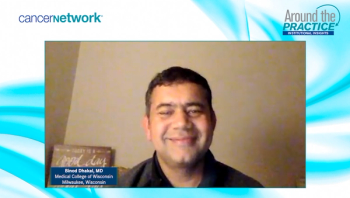
Dr Binod Dhakal discusses response rates and toxicities seen with recently approved bispecific antibodies talquetamab in patients with heavily pretreated multiple myeloma, noting high response rates even after CAR-T, but also unique side effects.






